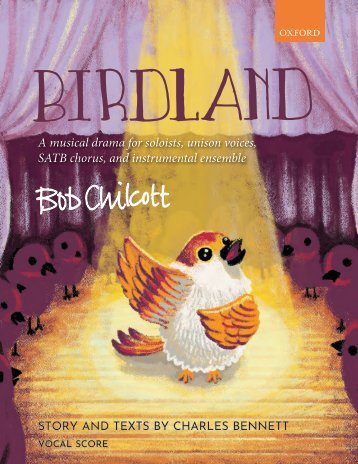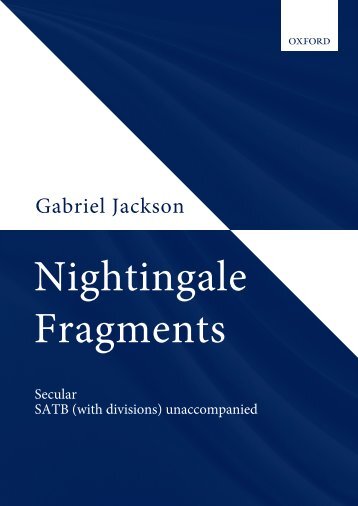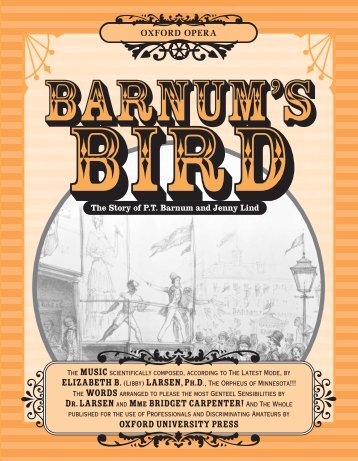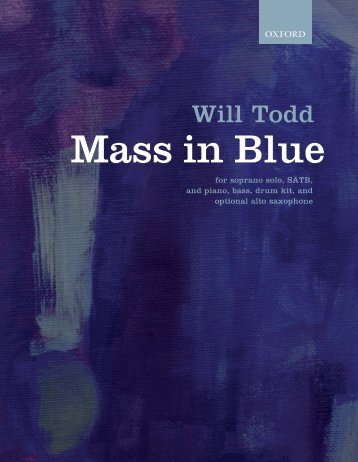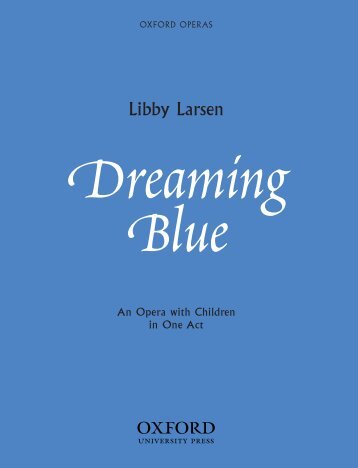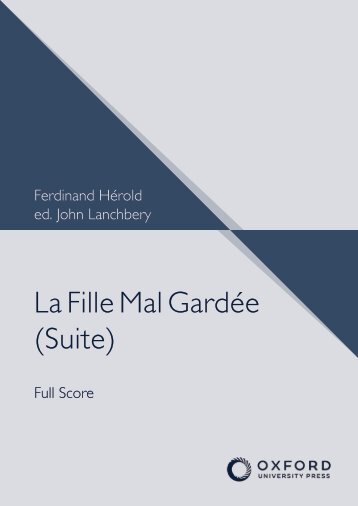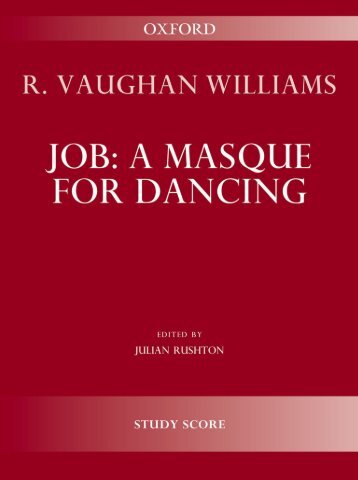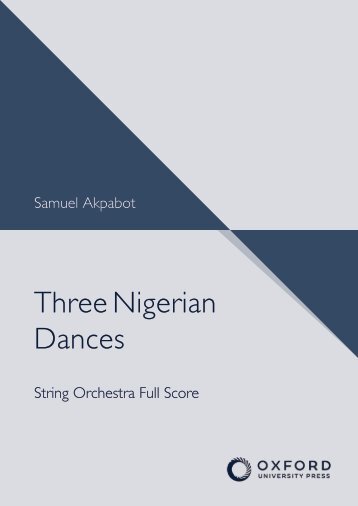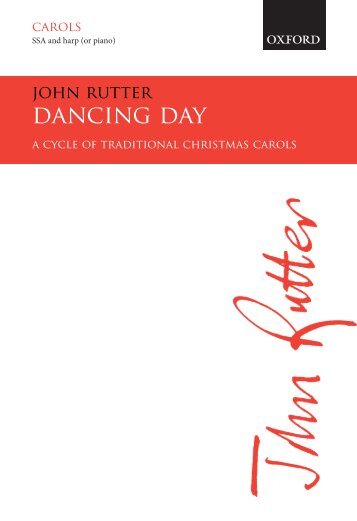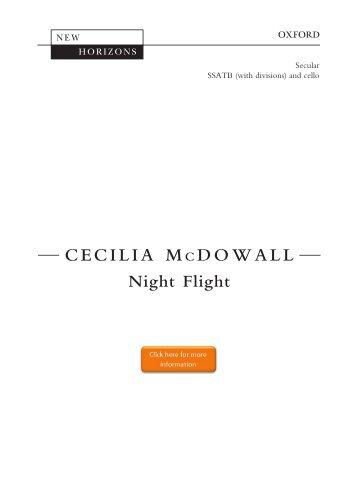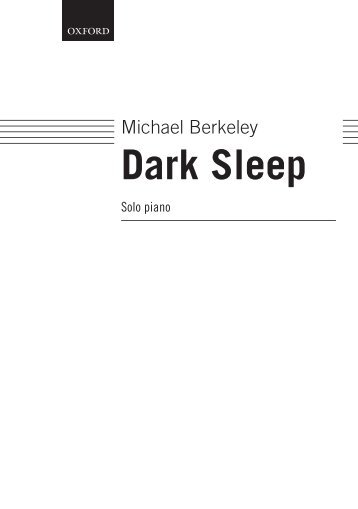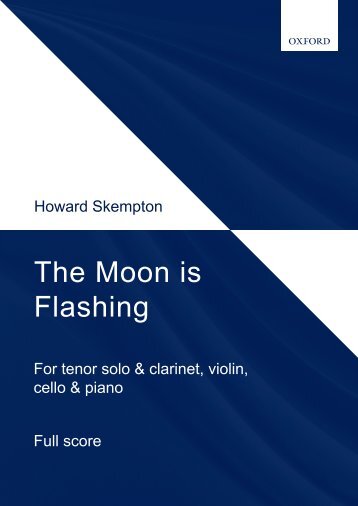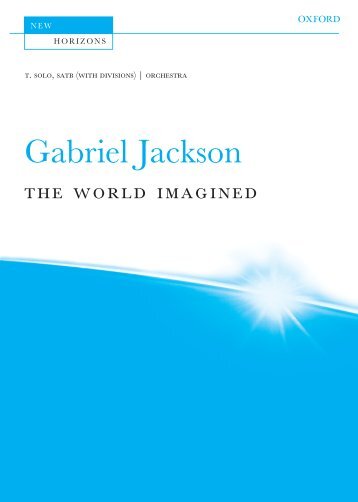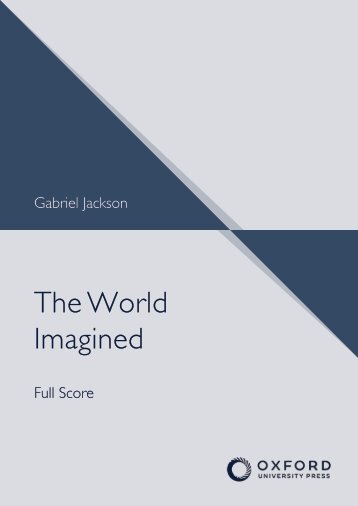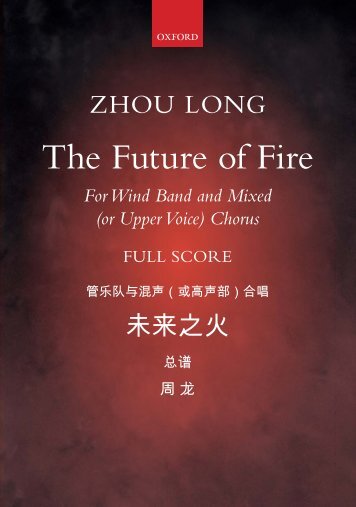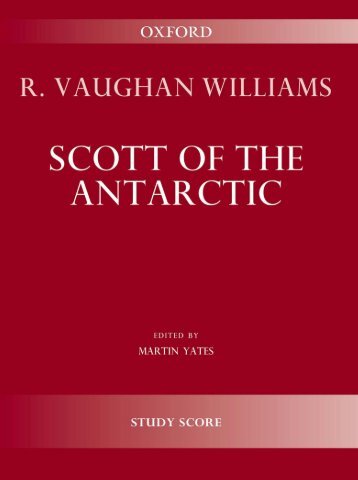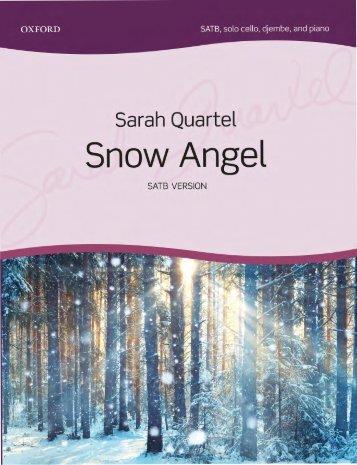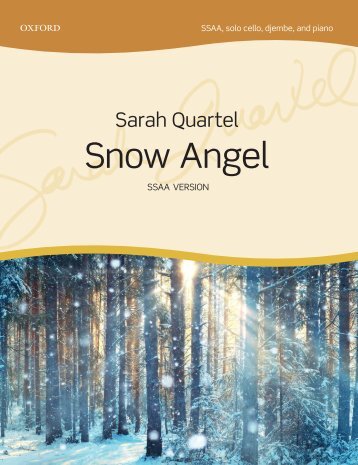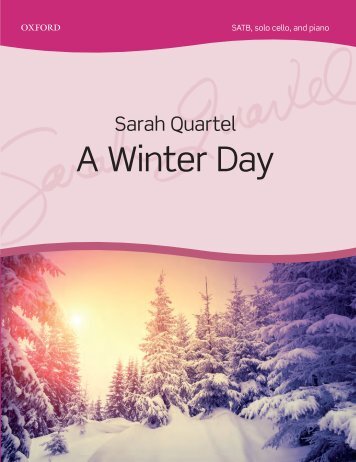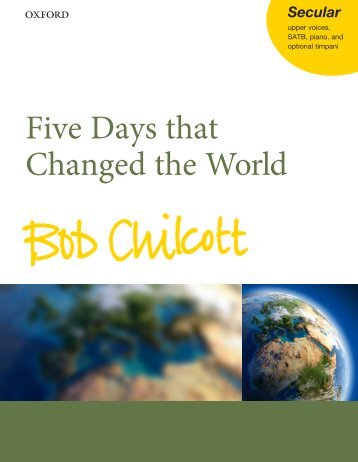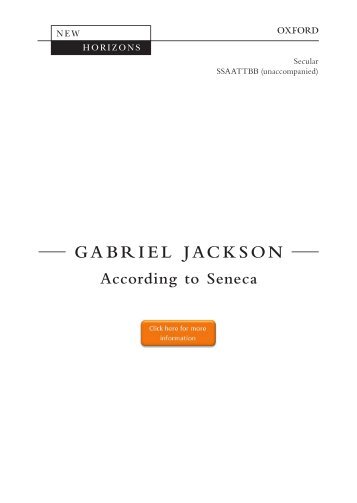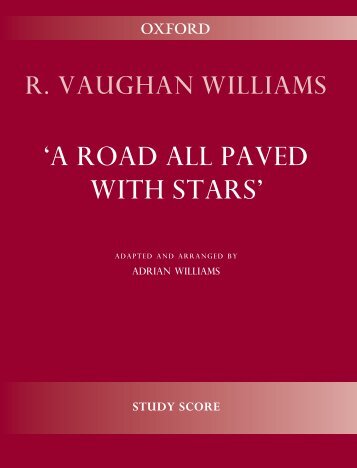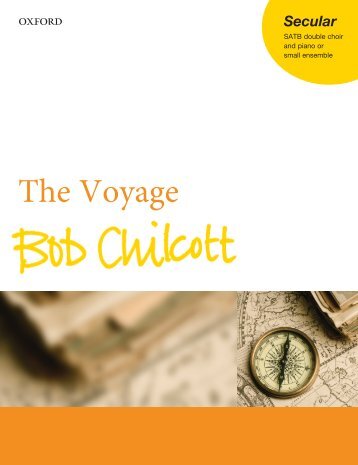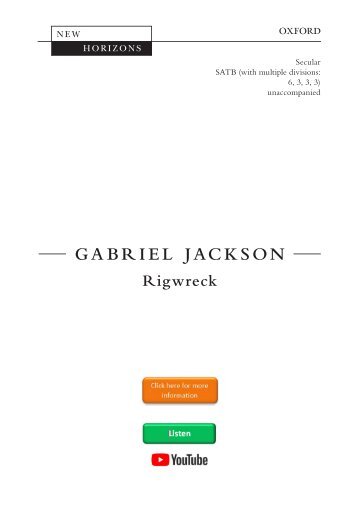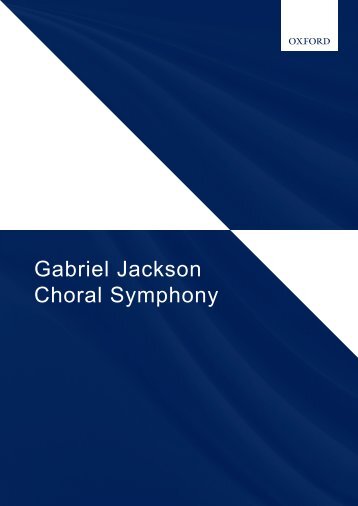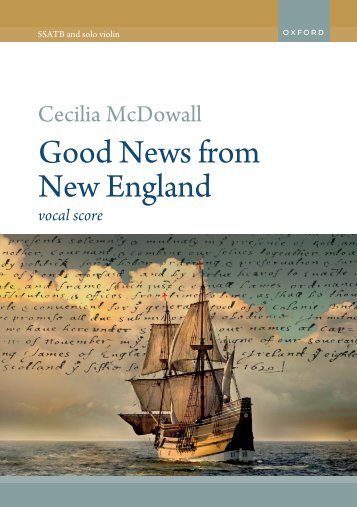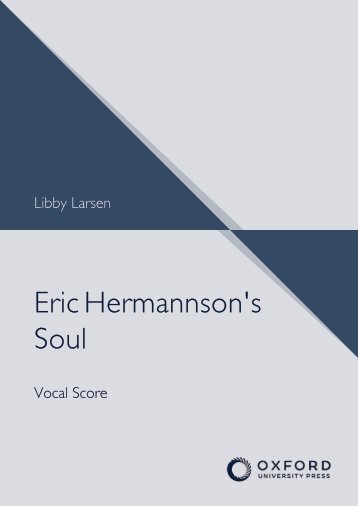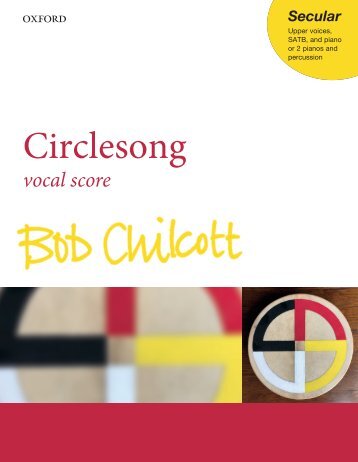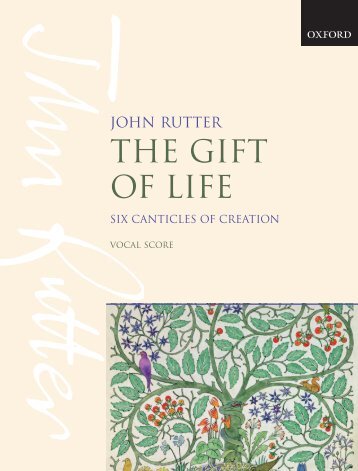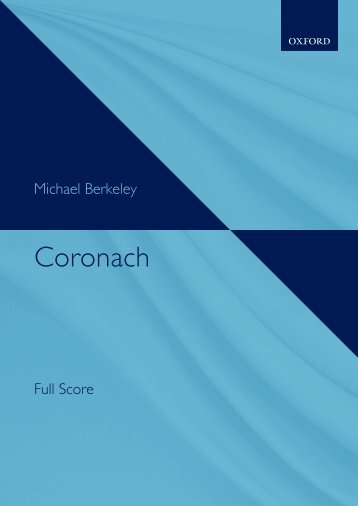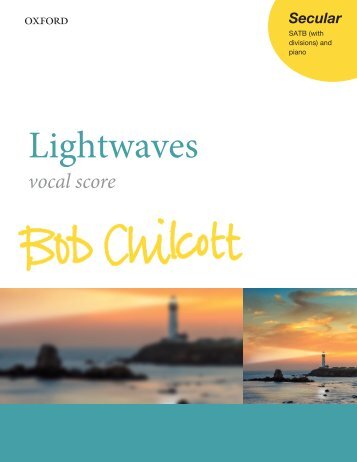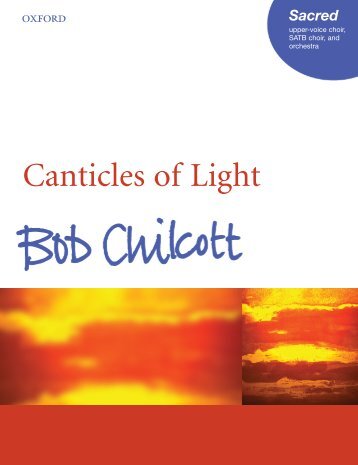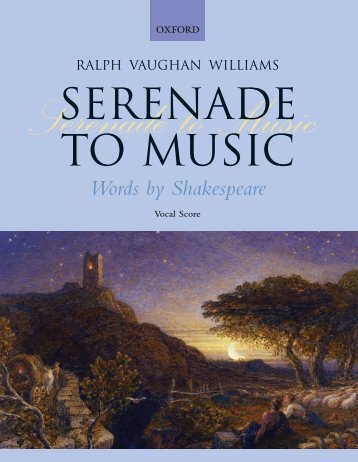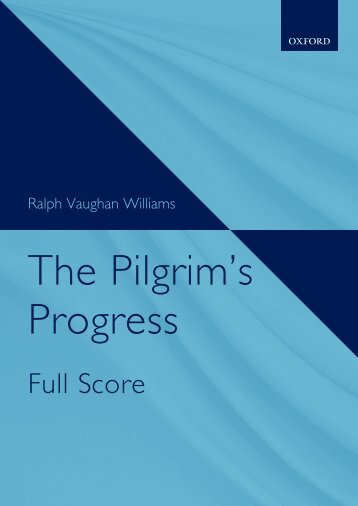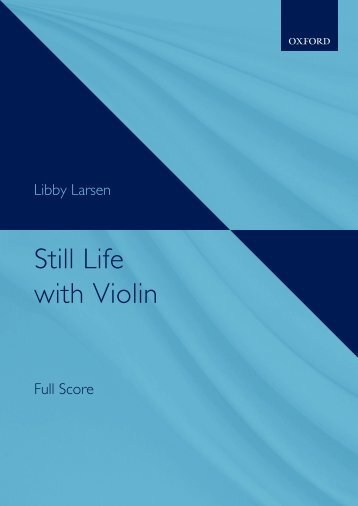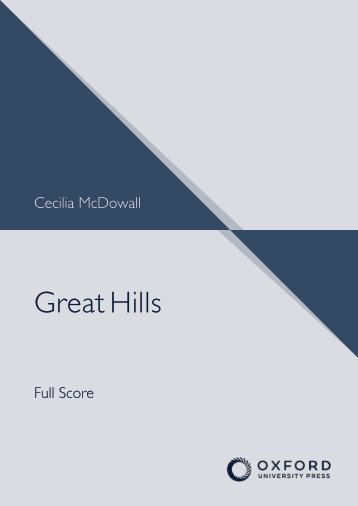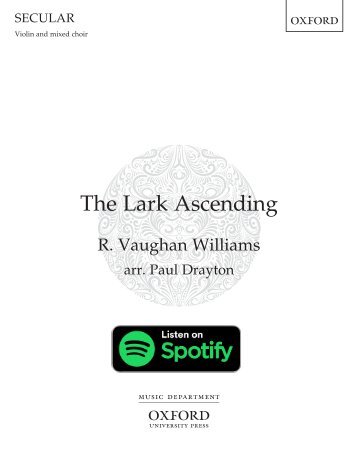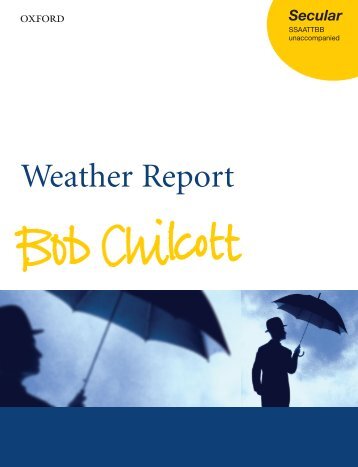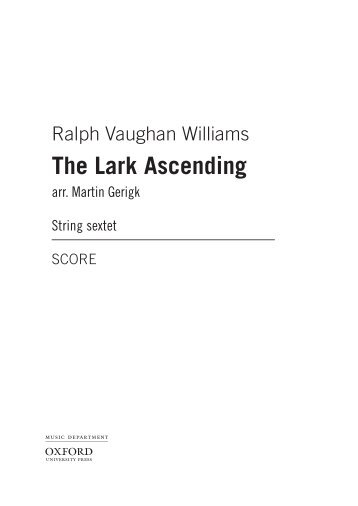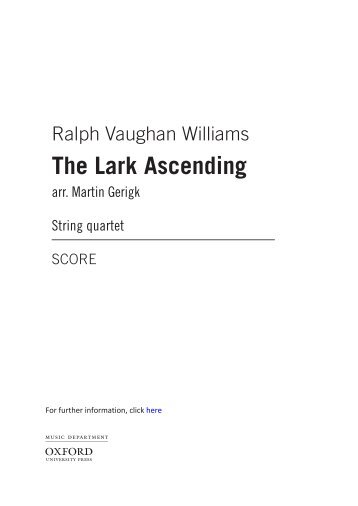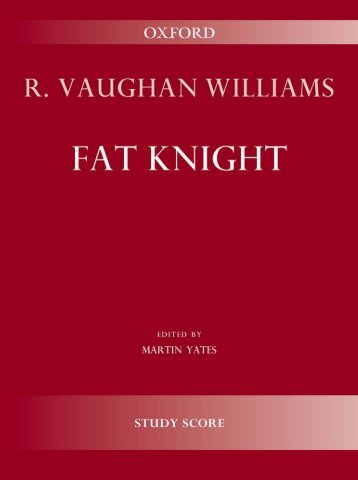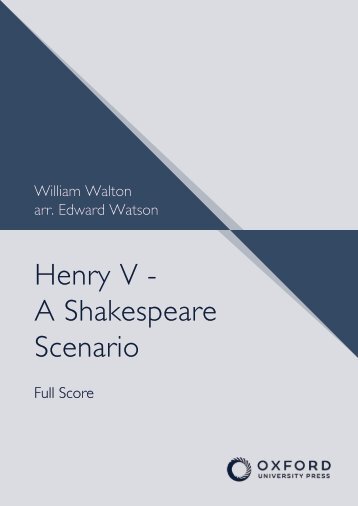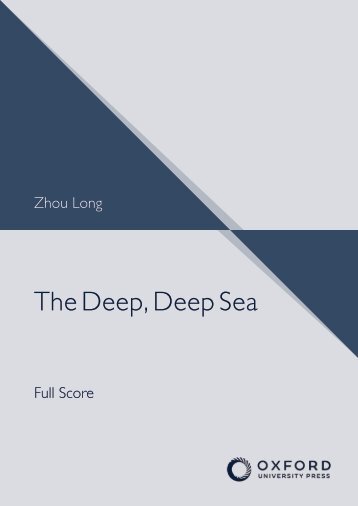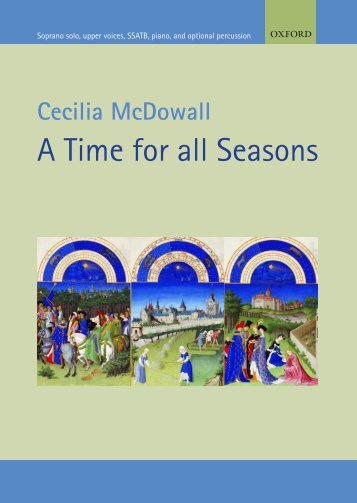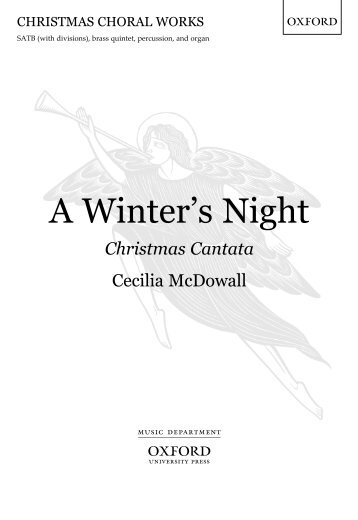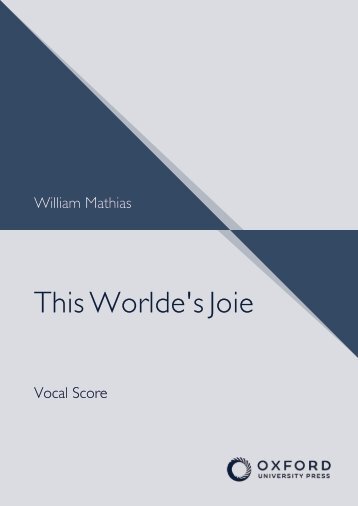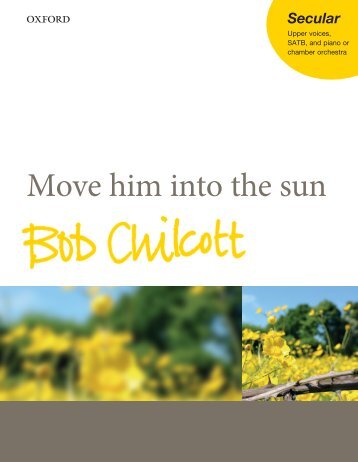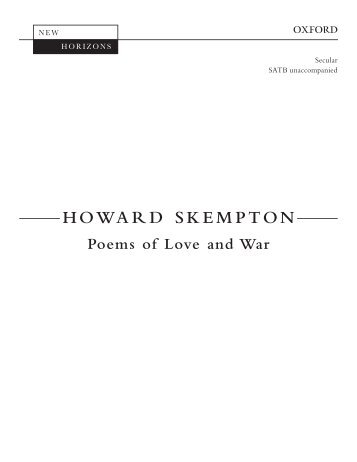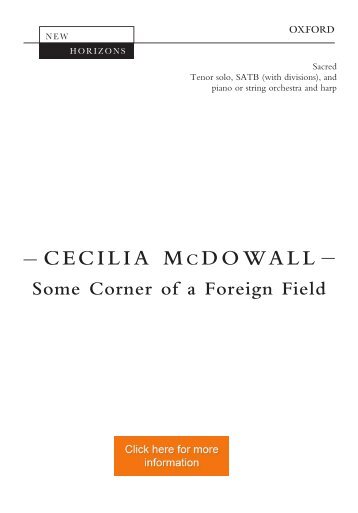
Oxford Programming by Theme
Oxford University Press is proud to publish musical works by some of the most significant composers of the 20th and 21st centuries, with a catalogue that includes a broad range of choral, orchestral and chamber music.

Themes
Select a theme from the list below to view playlists and perusal scores.
- Animals
- Colours
- Dances
- Day and Night
- Elements: Earth
- Elements: Fire
- Elements: Ice
- Elements: Water
- Historical Figures
- Journeys and Transport
- Life and Death
- Light and Dark
- Music about music and sound
- Myths, Legends, and Folktale
- Nature
- Royalty and Ceremony
- Rivers and Oceans
- The Seasons
- War and Conflict
Gabriel Jackson The World Imagined
- Text
- Chorus and orchestra
- Choral
- Oratorio
- Worldimagined
- Jackson
- Oxford
Texts I I look up to the
Texts I I look up to the sky and its stars, And down to the earth and the things that creep there. And I consider in my heart how their creation Was planned with wisdom in every detail. See the heavens above like a tent, Constructed with loops and with hooks, And the moon with its stars, like a shepherdess Driving her sheep to pasture; The moon itself among the clouds, Like a ship sailing under its banners; The clouds like a girl in her garden Moving, and watering the myrtle-trees; The dew-mist—a woman shaking Drops from her hair on the ground. The inhabitants turn, like animals, to rest, (Their palaces like their stables); And all fleeing from the fear of death, Like a dove pursued by the falcon. And these are compared at the end to a plate Which is smashed into innumerable shards. for online perusal only Samuel ha-Nagid (993–1055/6), trans. David Goldstein Text by Samuel ha-Nagid, translated by David Goldstein © Liverpool University Press. Reproduced with permission of the Licensor through PLSclear. v
II I always loved this solitary hill, This hedge as well, which takes so large a share Of the far-flung horizon from my view; But seated here, in contemplation lost, My thought discovers vaster space beyond, Supernal silence and unfathomed peace; Almost I am afraid; then, since I hear The murmur of the wind among the leaves, I match that infinite calm unto this sound And with my mind embrace eternity, The vivid, speaking present and dead past; In such immensity my spirit drowns, And sweet to me is shipwreck in this sea. for online perusal only Giacomo Leopardi (1798–1837), trans. Lorna de’ Lucchi III Blazing, unmoving sun over the isle of death, the white stone house of Time. They say it’s where eternal treasure dwells, and if they say it, it must be true. On the table is a jug, next to it a glass. Whoever drinks from it forgets their name and loses their shape, transforms into a grain of sand on the ground on the blinding beach of the isle of death. Doris Kareva (b. 1958), trans. Tiina Aleman Text by Doris Kareva, translated by Tiina Aleman © Doris Kareva. Used by permission. vi
- Page 1 and 2: NEW 2 HORIZONS t. solo, satb (with
- Page 3 and 4: 3 Great Clarendon Street, Oxford OX
- Page 5: Instrumentation Piccolo 2 Flutes 2
- Page 9 and 10: V Light the first light of evening,
- Page 11 and 12: 2 24 & bb b { ? b b b œ œ œ j
- Page 13 and 14: 4 48 ° & bb b mf œ œ J œ œ œ
- Page 15 and 16: 6 ° 3 2 3 & bb b 4 ˙ œ ‰ 4 ∑
- Page 17 and 18: 8 80 mf ° 3 & bb œ œ b 4 J œ œ
- Page 19 and 20: 10 91 ° & bb b ∑ ∑ œ j œ ? b
- Page 21 and 22: 12 106 mp mf ∑ Œ œ J œ œ œ
- Page 23 and 24: T. 14 118 ° & b b b ‹ (TENORS)
- Page 25 and 26: 16 136 ° & bb b b b b 4 & bb b b b
- Page 27 and 28: 18 147 ° & bb b b b b œ j ‰ Œ
- Page 29 and 30: 20 157 ° 3 & bb b 4 f p œ œ œ J
- Page 31 and 32: 22 180 p # T. 3 2 3 & 4 œ SOLO œ
- Page 33 and 34: 204 # 3 & ‹ 4 Œ Œ ‰ œ œ œ
- Page 35 and 36: 26 221 # T. & ∑ ∑ SOLO ‹ mf
- Page 37 and 38: 28 234 # & 4 ‹ ° & # 4 & # 4 # &
- Page 39 and 40: T. SOLO 30 240 & ‹ # 12 mf œ œ
- Page 41 and 42: T. SOLO S. 1 S. 2 A. 1 A. 2 32 ° &
- Page 43 and 44: S. A. T. B. 34 253 f ff ° & # - 5
- Page 45 and 46: 36 272 < > & # “ { ˙ ˙ ˙ ˙
- Page 47 and 48: 38 f 300 ° 2 3 2 5 2 3 3 & # # # #
- Page 49 and 50: 40 17 325 ° 3 3 & # # # # 4 ∑ 4
- Page 51 and 52: 42 338 ° & # # # # 3 ˙ œ œ œ 4
- Page 53 and 54: 44 { & # # # # > > .- - .- - > > >
- Page 55 and 56: 46 378 ° 5 3 2 3 & b b œ œ b 8
- Page 57 and 58:
48 400 ° 5 3 5 2 & # # # # 8 œ œ
- Page 59 and 60:
50 423 ° 5 3 2 3 4 3 & # # # # > >
- Page 61 and 62:
52 444 pp ° 5 3 4 & # # # # 8 Œ
- Page 63 and 64:
54 458 ° & bb b & bb b Ó ‰ Ó
- Page 65 and 66:
56 466 ° & bb b & bb b > œ j œ
- Page 67 and 68:
58 476 ° & bb b & bb b & b b b ‹
- Page 69 and 70:
60 486 ° & bb b f œ œ œ œ œ
- Page 71 and 72:
62 498 ° & bb b & bb b & b b b ‹
- Page 73 and 74:
64 510 25 f ° 3 & # Ó ˙ 4 œ œ
- Page 75 and 76:
66 526 ° & # & # œ œ œ J œ Œ
- Page 77 and 78:
68 541 p ° & # . . . . ‰ . œ j
- Page 79 and 80:
70 553 mp ° & bb S. b Ó œœ j œ
- Page 81 and 82:
72 563 ° & bb b 4 > œ œ œ œ œ
- Page 83 and 84:
74 583 mf mp # & # # # œ œ œ œ
- Page 85 and 86:
76 606 ˙ œ œ œ œ ˙ Ó -tuned
- Page 87 and 88:
78 639 30 ° & bb b4 S. ∑ & bb b4
- Page 89 and 90:
S. 31 SOPRANOS 649 f ° ¢ & bb b
- Page 91 and 92:
82 673 ° & bb b œ œ œ ˙ Œ
- Page 93 and 94:
84 687 ° & bb b w ww ˙˙ ˙ ˙ ˙
- Page 95 and 96:
86 701 ° & bb b & bb b & ‹ b b b
- Page 97 and 98:
88 713 ° & bb b œ œ œ œ J ˙
- Page 99 and 100:
90 Wallace Stevens (1879-1955) V TE
- Page 101 and 102:
92 753 ° & # # 4 mf mp ˙œ œ œ
- Page 103 and 104:
94 770 ° & bb b ∑ ∑ & bb b ∑
- Page 105 and 106:
96 œ œ œ J ? b b b 788 f œ p mf
- Page 107 and 108:
98 804 38 ° 3 & bb b 4 bœ bœ œ
- Page 109 and 110:
° & bb b b b b ∑ ∑ ∑ ? ¢ b
- Page 111 and 112:
102 831 3 & b b b 4 ∑ 4 Œ ‰
- Page 113 and 114:
104 S. 848 ° 3 & bb b 4 ## œ n#
- Page 115 and 116:
106 863 & bb b { mf ° & bb b œ œ
Inappropriate
Loading...
Mail this publication
Loading...
Embed
Loading...

